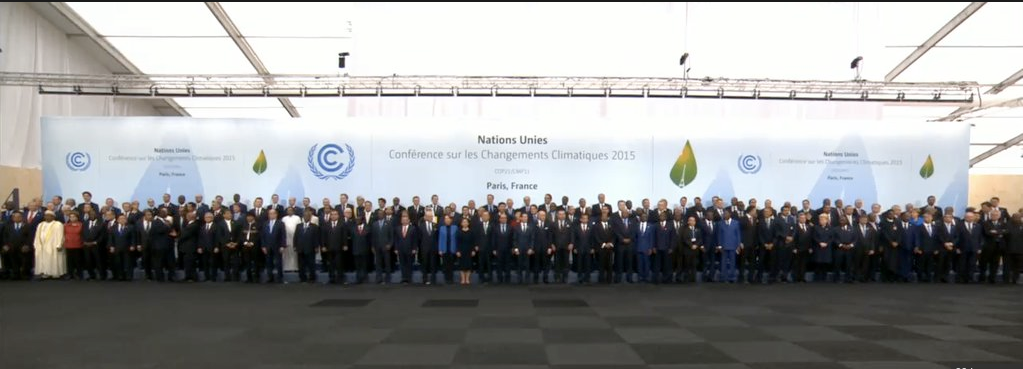World leaders are meeting in Paris this month in what amounts to a last-ditch effort to avert the worst ravages of climate change. Climatologists now say that the best case scenario — assuming immediate and dramatic emissions curbs — is that planetary surface temperatures will increase by at least 2 degrees Celsius [3.6 degrees Fahrenheit] in the coming decades.
This may sound like a small uptick, but the implications are profound. Rising temperatures will destroy plant and animal habitats, and reduce yields of important food crops. More people will be exposed to the ravages of flooding and drought.
(Huffington Post, November 30, 2015)
Listening to talks at this Paris conference, which convened yesterday, you could be forgiven for thinking the clear and present danger the world faces is climate change, not Islamic terrorism.
Except that, to anyone who knows anything about the global effort to combat climate change, their rhetoric must seem more Chicken Little than clairvoyant. After all, much of what world leaders are saying in Paris today parrots what their respective predecessors said in Kyoto almost 20 years ago.
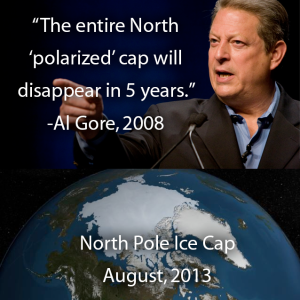 U.S. Vice President Al Gore is the self-anointed prophet/alarmist of climate-change. Here is the dire warning he issued in 2006.
U.S. Vice President Al Gore is the self-anointed prophet/alarmist of climate-change. Here is the dire warning he issued in 2006.
Humanity is sitting on a ticking time bomb. If the vast majority of the world’s scientists are right, we have just ten years to avert a major catastrophe that could send our entire planet into a tail-spin of epic destruction involving extreme weather, floods, droughts, epidemics and killer heat waves beyond anything we have ever experienced.
(climatecrisiscoalition.org)
Gore also famously prophesied in 2008 that the North polar ice caps would disappear in five years. In reality, 2013 saw those ice caps expanding:
Arctic sea ice extent is increasing… For October 2015 [it] averaged 2.98 million square miles…367,000 square miles above the record low monthly average for October that occurred in 2007.
(National Snow & Ice Data Center, November 4, 2015)
Incidentally:
The Kyoto Protocol is an international agreement linked to the United Nations Framework Convention on Climate Change, which commits its Parties by setting internationally binding emission reduction targets.
[It] was adopted in Kyoto, Japan, on 11 December 1997.
(UNFCCC.int/Kyoto-protocol)
I have written many commentaries over the years championing enlightened environmental practices over apocalyptic climate rhetoric. In doing so, I invariably cited the American conservation movement, which dates back to the 1890s, as well as the Earth Day practices it sprouted back in the 1960s – as this excerpt from “Happy 39th Earth Day, April 22, 2009, attests.
__________________
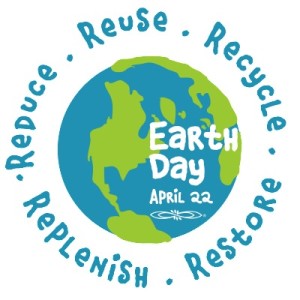 The environmental practices this day inaugurated have become so routine and universal that the symbolic replenishing of Earth’s natural resources — by planting trees — now seems trite, if not contrived. Granted, to hear all of the alarmist talk about climate change, you’d think it was Al Gore who transformed public consciousness in this regard only years ago with sermons from his environmental bible, Earth in the Balance.
The environmental practices this day inaugurated have become so routine and universal that the symbolic replenishing of Earth’s natural resources — by planting trees — now seems trite, if not contrived. Granted, to hear all of the alarmist talk about climate change, you’d think it was Al Gore who transformed public consciousness in this regard only years ago with sermons from his environmental bible, Earth in the Balance.
But this celebration of and deference to Earth’s natural wonders should be distinguished from Gore’s convenient truths about climate change; so-called truths which include using fake images of melting glaciers in his documentary “An Inconvenient Truth” just to scare people.
After all, the original Earth Day ushered in conservation and greening trends that have led to cleaner air, more potable (lead-free) water, and a much less polluted environment. Whereas, by Gore’s own admission, there has been ‘no improvement in the fight against climate change’ since he began prophesying about global warming.
____________________
Americans are fond of declaring themselves exceptional. But there’s nothing exceptional about the human desire to breathe clean air and drink clean water.
Therefore, just as Americans became environmentally conscious only after fully reaping the benefits of industrialization, the Chinese, Indians and peoples of other developing nations will undoubtedly do the same. Beijing is the smog capital of the world today. But, as recently as twenty years ago, this dubious distinction still belonged to Los Angeles.
 Frankly, instead of trying to combat climate change, world leaders would do more to save the planet by championing, among other things, Earth Day initiatives to curb deforestation, promote a plant-based diet, limit drilling for oil and gas, improve public transportation, ban plastics, and criminalize unethical trade in wildlife – all of which are causing all manner of life-sustaining plant and sea species to race towards extinction. Indeed, you’d be far more informed about just how much earth is in the balance by watching Discovery Channel’s Racing Extinction, which premieres on December 2, than by listening to all of the hot air coming out of this Paris summit.
Frankly, instead of trying to combat climate change, world leaders would do more to save the planet by championing, among other things, Earth Day initiatives to curb deforestation, promote a plant-based diet, limit drilling for oil and gas, improve public transportation, ban plastics, and criminalize unethical trade in wildlife – all of which are causing all manner of life-sustaining plant and sea species to race towards extinction. Indeed, you’d be far more informed about just how much earth is in the balance by watching Discovery Channel’s Racing Extinction, which premieres on December 2, than by listening to all of the hot air coming out of this Paris summit.
Not to mention that President Obama’s leadership in negotiating this Paris Protocol seems fated to be undermined, just as President Clinton’s was with respect to the Kyoto Protocol. After all, the Republican-controlled Senate voted 95-0 against ratifying the protocol Clinton signed, and this Republican-controlled Senate seems even more hell-bent against ratifying any protocol Obama signs.
On Capitol Hill, Senate Republicans suggested last week that the GOP-led chamber must approve the Paris deal, or it will withhold billions that the U.S. has pledged, as part of the pact, to help poor countries reduces their carbon output.
‘Congress will not be forthcoming with these funds in the future without a vote in the Senate on any final agreement as required in the U.S. Constitution,’ Oklahoma Sen. James Inhofe, chairman of the Senate Environment and Public Works Committee, and 36 other GOP senators said in a letter to Obama.
(FOX News, November 28, 2015)
It’s noteworthy that Republican President George W. Bush reinforced the Senate’s vote against ratification by withdrawing the United States from the Kyoto Protocol entirely in 2002. And Republican presidential candidates are making quite a show of deriding the Paris talks, while vowing to rollback many regulations to curb greenhouse gas emissions, which Obama enacted by executive order.
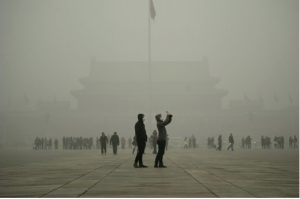 Of far greater significance, though, is the role the leader of the world’s biggest polluter, China, is playing in Paris. For President Xi Jinping is straddling divisions between rich and poor nations, which reared their heads in Kyoto, bedeviled attempts to set new goals in Copenhagen (2009), and seem likely to do the same in Paris. This, even with toxic smog (from smokestacks of coal-burning power plants) descending like fog almost daily over his mainland.
Of far greater significance, though, is the role the leader of the world’s biggest polluter, China, is playing in Paris. For President Xi Jinping is straddling divisions between rich and poor nations, which reared their heads in Kyoto, bedeviled attempts to set new goals in Copenhagen (2009), and seem likely to do the same in Paris. This, even with toxic smog (from smokestacks of coal-burning power plants) descending like fog almost daily over his mainland.
As always, those divisions revolve around poor nations demanding “climate justice,” which would require rich nations to bear the cost of the carbon emissions poor nations believe will be the unavoidable by-product of their ongoing development.
Interestingly enough, many are citing the landmark agreement the United States and China struck to curb carbon emissions as a galvanizing pivot towards reconciling these divisions. Here in part is how I commented on it in “China-U.S. Landmark Agreement More about Clean Air than Climate Change,” November 15, 2014.
____________________
China pulled a Shanghai surprise this week at the Asia-Pacific Economic Co-operation (APEC) summit, when it announced a bilateral agreement with the United States to reduce emissions of greenhouse gases.
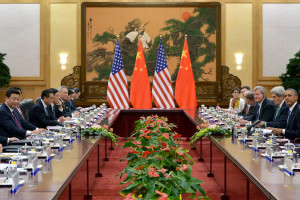 [T]his agreement is a good thing not because it advances man’s Sisyphean attempts to control Mother Nature (i.e., by stopping polar caps melting and sea levels rising). It’s a good thing because it will enable China’s 1.3 billion people to breathe cleaner air (even as its tired, poor, huddled masses continue their political ‘yearning to breathe free’).
[T]his agreement is a good thing not because it advances man’s Sisyphean attempts to control Mother Nature (i.e., by stopping polar caps melting and sea levels rising). It’s a good thing because it will enable China’s 1.3 billion people to breathe cleaner air (even as its tired, poor, huddled masses continue their political ‘yearning to breathe free’).
After all, China has almost as many coal-burning smokestacks fueling its economic growth as the United States has coffee-brewing Starbucks fueling its people’s get up and go…
This distinction is important to appreciate because global-warming alarmists, like Al Gore, have been drowning out the inconvenient truth that, even though it is the world’s leading emitter of greenhouse gasses, China is fast becoming the world’s leading producer of clean, renewable energy (e.g., from solar, wind, and hydro sources). One should also appreciate the distinction between countries implementing policies borne of alarmist fears about destroying the planet (which the United States represents), and those implementing policies borne of due regard for the exhaustible resources the planet provides for the benefit of mankind (which China represents).
Not to mention the hypocrisy inherent in Western countries lecturing China about the greenhouse gasses its factories emit in the process of producing everything from cheap phones to cheap toys for Western consumption.
__________________
I cannot overstate that China is making Earth Day-like investments in renewable energy not pursuant to some global treaty (even though, unlike the United States, it duly ratified Kyoto), but because its people are beginning to demand cleaner air.
What’s more, Xi has nothing to lose economically, but everything to gain politically, by straddling divisions between rich and poor nations in Paris. Not least because there’s a glaring loophole in China’s bilateral agreement with the United States – as there was in the Kyoto Protocol and is bound to be in this Paris Protocol. Namely, despite being the world’s biggest polluter and fast becoming its richest economy, China (and other developing nations) will not be obligated to reduce greenhouse gas emissions for a decade (or more).
Even so, this loophole is the least of many concessions poor countries are trying to extract from rich countries, arguing at every conference that the latter not only caused but benefited from greenhouse gas emissions during the Industrial Revolution of the 18th and 19th centuries, which is the primary cause of global warming today. More to the point, while rich countries are framing these talks as mankind’s last chance to save the planet from the ravages of climate change, poor nations are framing them as the rich countries’ latest attempt to impose do-as-I-say-not-as-I-do restraints on their economic development.
[U]nlike the top two emitters, the United States and China, India has balked at committing to major carbon reduction targets, instead vowing to double coal production by 2020.
It argues stricter emissions targets would compromise efforts to boost living standards of more than a quarter of its 1.2 billion population which lives in poverty.
[India] also called on wealthy countries to support the developing world in dealing with the effects of climate change, including the increasing frequency of floods, drought and erratic monsoons.
(New Delhi TV, November 23, 2015)
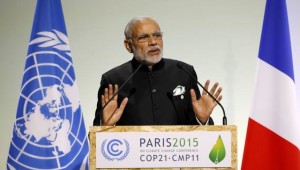 In fact, some developing nations are demanding developed nations pay reparations (amounting to hundreds of billions) for the environmental damage their development caused, which all nations are now being forced to cure.
In fact, some developing nations are demanding developed nations pay reparations (amounting to hundreds of billions) for the environmental damage their development caused, which all nations are now being forced to cure.
This is why, even though the politics of climate change will compel all world leaders to sign the Paris Protocol, the economics of climate change will compel most of them to ignore their commitments.
Not to mention that:
- Whatever they agree to in Paris will not be binding on any of the signatories.
- Even if, like Kyoto’s, the terms were legally binding, they would not be enforceable.
- It’s beyond naïve to expect world leaders to honor pledges to combat a potential disaster like climate change – given their vainglorious habit of dishonoring pledges to deal with unfolding disasters like the Indonesian tsunami and Haitian earthquake.
That said, it might be helpful to know that, according to the UN Intergovernmental Panel on Climate Change (IPCC), the planet warmed by 1.53 °F (0.85ºC) from 1880 to 2012. Therefore, it’s arguable that, even accounting for population growth, as China leads developing nations in emulating developed nations with Earth Day-like practices, climatological prophecies about the planet warming by as much as 6°F over the next 100 years (with all of the apocalyptic consequences that would entail) will probably never be fulfilled.
Indeed, the IPCC duly notes that natural variations or cyclical phenomena like La Niña, which tends to cool the global atmosphere, have caused, and will continue to cause, “occasional pauses” in warming … of indeterminate lengths.
Which brings me to my abiding take on global warming/climate change.
I’ve written far too many commentaries on this topic to count. Unfortunately, they’ve done little more than lump me together with the ‘heretics’ trying to temper increasing alarms about climate change with calming facts about environmental protection and conservation.
Therefore, on behalf of all proud heretics in this respect, let me hasten to clarify that, while acknowledging climate change as a fact but hardly an existential threat, we have maintained that there are many “Global Priorities Bigger than Climate Change” – as the critically acclaimed Danish environmentalist, Professor Bjorn Lomborg, proffered in his now seminal TED talk in 2005.
(“March to Save the Planet? Get Real!” The iPINIONS Journal, September 23, 2014)
The above should affirm my solidarity with the India-led camp of developing nations. But such commentaries as “Global Warming or Just Hot Air,” February 16, 2005, and “Return of the Polar Ice Caps. I Told You So!” September 12, 2013, will attest to my vanguard support for their side in the ongoing global effort to combat climate change.
Related commentaries:
Earth Day…
March to save planet…?
China-US agreement…
Save planet vs. save economies…
* This commentary was originally published yesterday, Tuesday, at 8:23 a.m.
